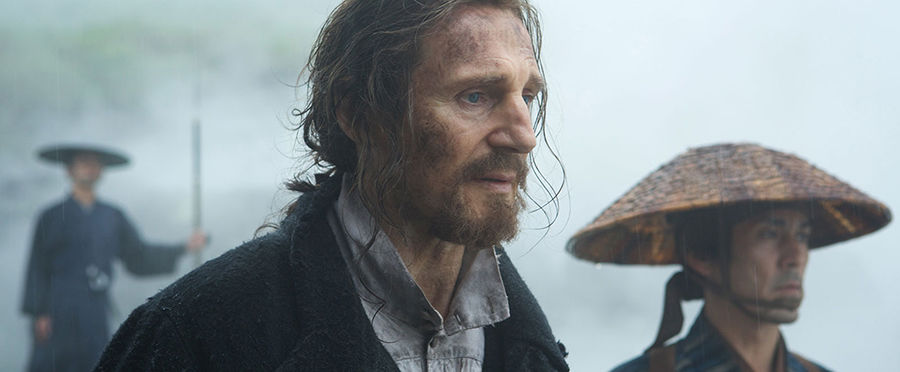After decades of his creating films about tough New Yorkers and people immersed in various criminal endeavors, it might be surprising to find that legendary director Martin Scorsese’s dream project is about Jesuit missionary priests faced with martyrdom in 1600s Japan.
But the new movie “Silence,” out nationwide on Jan. 13, dives deeply into just that subject matter and results in a film that is sure to inspire contemplation and debate among Catholics about how much they could endure for their faith.
Based on Shusaku Endo’s novel of the same name, “Silence” follows the story of two missionary priests, Rodrigues (Andrew Garfield) and Garrpe (Adam Driver), who hear about a missionary named Ferreira (Liam Neeson) who is believed to have become an apostate while on a mission to Japan. They refuse to believe that he turned his back on his priestly vocation and are determined to prove his innocence, even over the objections of their superior, who feels that they will be martyred themselves if they dare set foot in Japan.
Their ensuing adventures in Japan form the heart of the film, which powerfully shows the dramatic yearning that the Japanese converts have for receiving Holy Communion and Confession, even at risk of their own deaths. Speaking at the movie’s world premiere Jan. 5 at the Directors Guild of America Theater on Sunset Boulevard, several of those involved gave insights about what drove Scorsese to pursue the right to make the film for 28 long years.
“It’s about the question of faith, and it gives both sides of that for doubters and those who believe,” said Thelma Schoonmaker, Scorsese’s longtime, Oscar-winning editor. “It was a great chance for Marty to express his own deep interest in religion, after it’s had to be under wraps for so long. The movie reawakened my own feelings about religion. Because it presents both sides, it’s very devastating when that other side is presented. But then there’s a twist that makes it alright.”
The movie’s central question comes into play in asking if there is ever a point that is acceptable for the priests to deny their faith in Christ, if it means saving the lives of their converts from horribly tortuous deaths. By extension, it becomes a movie that speaks directly to the world of today, due to the horrific acts of violence perpetrated by the terrorist group ISIS against Muslims and non-Muslims.
“We made this movie against strong odds of studios afraid to support such heavy subject matter by finding and knowing bold men who had vision and were willing to take risks on a movie that if done right deals with issues more prevalent today than anytime in the past 100 years,” said Matthew J. Malek, one of the many producers who came together to make Scorsese’s dream a reality. “In the ‘80s and ‘90s there was no ISIS, no common issue people can relate to. Today, people know from the news or personally someone — my dad is an immigrant from Iraq who fled persecution — and it relates so much.”
In fact, “Silence” has drawn so much attention from Catholic circles that Scorsese and his team were invited to show the film at the Vatican to Pope Francis, as well as to a large group of Jesuits. Considering the controversy Scorsese was shrouded in by making “The Last Temptation of Christ” in 1988, the ability to take the new film to the Holy See marked an incredible turnaround.
“When we showed this movie at the Vatican to an audience of 200 Jesuit missionaries, the questions were remarkable,” said Jay Cocks, who cowrote the film with Scorsese. “The pope’s screening was the next day. One guy stood up, my favorite Jesuit, and he talked about the conflict between culture and conscience in this film. Somehow he understands that, and it added to my own understanding of the film, giving me insights I didn’t even know were there.”
But the person in attendance who had the most to say (since Scorsese did not make himself available for questioning) was its main star, Andrew Garfield. As Rodrigues, he delivers a performance of unimaginable pain and sorrow and beauty shown through the strength found in faith.
While Garfield will likely earn a Best Actor Oscar nomination for the role, he’s also in consideration for his performance in another highly acclaimed film about Christian faith, Mel Gibson’s movie “Hacksaw Ridge.” It may seem a long way from his breakthrough role as Peter Parker and Spider-Man in two “Amazing Spider-Man” films, but Garfield notes that there’s a direct through-line to his career that has been rooted in questions of faith.
“These two films have more overt thematic drive, which is the idea of what it means to live a life of faith, but I think all my films deal in similar things,” explained Garfield. “Even as Spider-Man, we ask how do you live a life for others, devoted to others and your fellow man, and do something greater than just living for yourself. I’m curious about what the most fulfilling road of life will be and is, and I think it’s very, very hard to identify that in the culture and we don’t have an opportunity often with all the distractions.”

